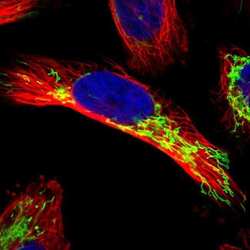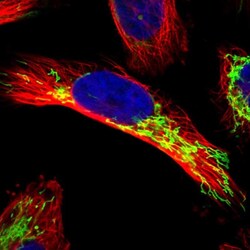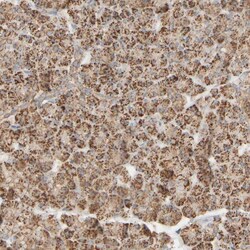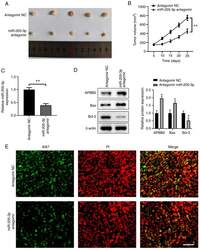Antibody data
- Antibody Data
- Antigen structure
- References [1]
- Comments [0]
- Validations
- Immunocytochemistry [2]
- Immunohistochemistry [1]
- Other assay [1]
Submit
Validation data
Reference
Comment
Report error
- Product number
- PA5-54816 - Provider product page

- Provider
- Invitrogen Antibodies
- Product name
- APBB2 Polyclonal Antibody
- Antibody type
- Polyclonal
- Antigen
- Recombinant protein fragment
- Description
- Immunogen sequence: SEKLEGKEPH PQDSSSCEIL PSQPRRTKSF LNYYADLETS ARELEQNRGN HHGTAEEKSQ PVQGQASTII GNGDLLLQKP NRPQSSPEDG QVATVSSSPE TKKDHPKTGA KTDCALHRIQ NLAPS Highest antigen sequence identity to the following orthologs: Mouse - 85%, Rat - 23%.
- Reactivity
- Human
- Host
- Rabbit
- Isotype
- IgG
- Vial size
- 100 μL
- Concentration
- 0.2 mg/mL
- Storage
- Store at 4°C short term. For long term storage, store at -20°C, avoiding freeze/thaw cycles.
Submitted references miR‑205‑3p promotes lung cancer progression by targeting APBB2.
Xu LB, Xiong J, Zhang YH, Dai Y, Ren XP, Ren YJ, Han D, Wei SH, Qi M
Molecular medicine reports 2021 Aug;24(2)
Molecular medicine reports 2021 Aug;24(2)
No comments: Submit comment
Supportive validation
- Submitted by
- Invitrogen Antibodies (provider)
- Main image

- Experimental details
- Immunofluorescent staining of APBB2 in human cell line U-251 MG shows positivity in mitochondria. Samples were probed using an APBB2 Polyclonal Antibody (Product # PA5-54816).
- Submitted by
- Invitrogen Antibodies (provider)
- Main image

- Experimental details
- Immunofluorecent analysis of APBB2 in human cell line U-251 MG using APBB2 Polyclonal Antibody (Product # PA5-54816). Staining shows positivity in mitochondria.
Supportive validation
- Submitted by
- Invitrogen Antibodies (provider)
- Main image

- Experimental details
- Immunohistochemical analysis of APBB2 in human pancreas using APBB2 Polyclonal Antibody (Product # PA5-54816) shows distinct granular positivity in exocrine cells.
Supportive validation
- Submitted by
- Invitrogen Antibodies (provider)
- Main image

- Experimental details
- Figure 6. miR-205-3p antagomir inhibits lung cancer growth and promotes apoptosis in mouse xenografts. (A) Representative images of excised xenograft tumors and (B) tumor volumes from mice treated with the antagomir NC or miR-205-3p antagomir. (C) Reverse transcription-quantitative PCR analysis was used to detect miR-205-3p expression in tumors. (D) Western blot analysis was used to detect APBB2, Bax and Bcl-2 protein expression levels in tumors. *P
 Explore
Explore Validate
Validate Learn
Learn Western blot
Western blot Immunocytochemistry
Immunocytochemistry